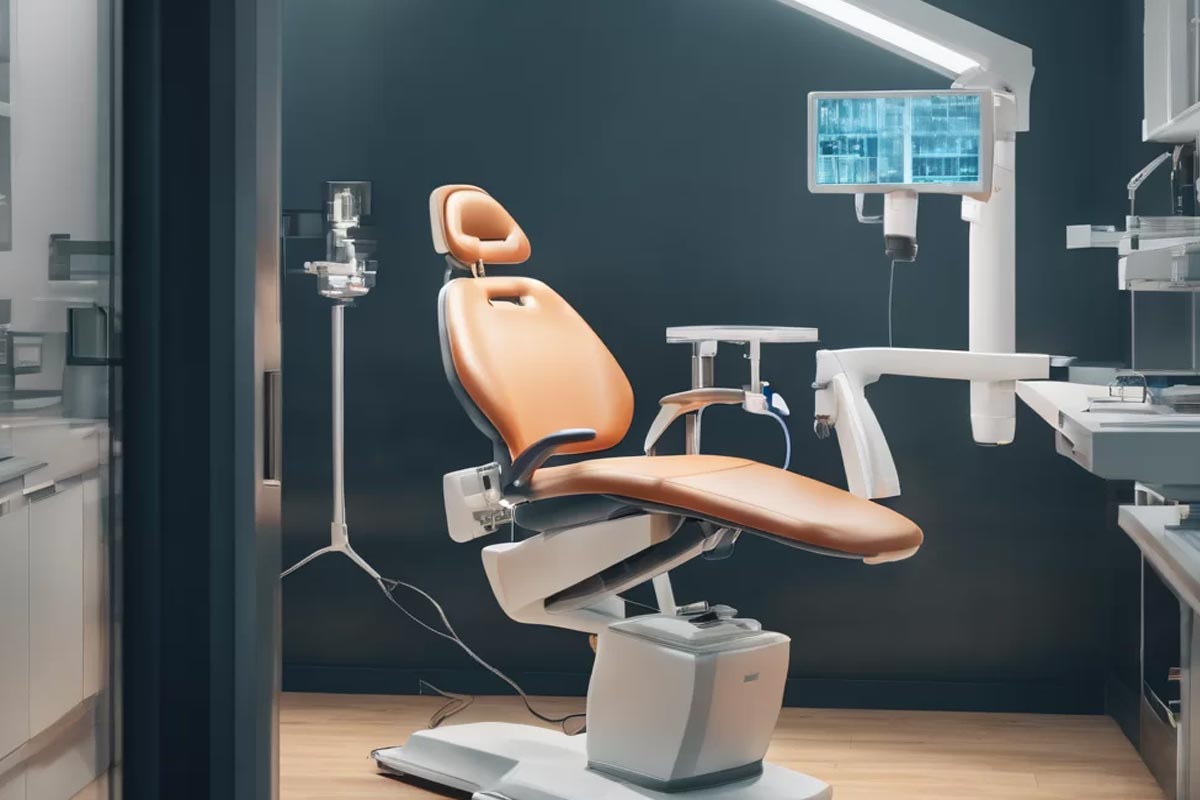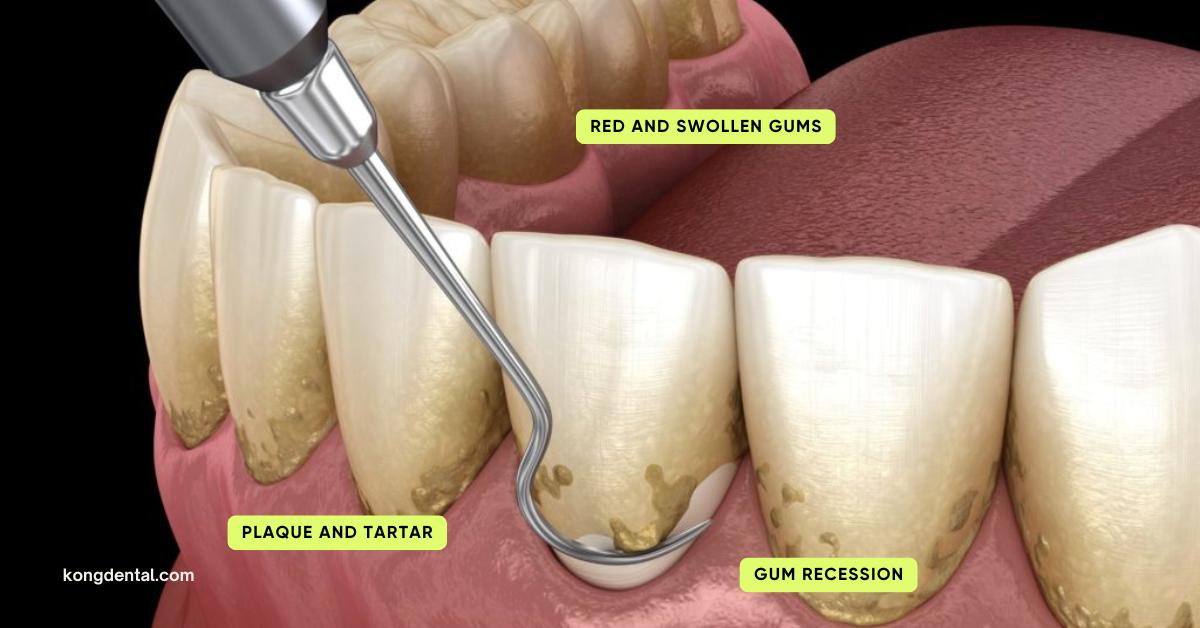6 Signs You Should Visit A Periodontist for Gum Disease Treatment

You might be aware that a periodontist is a gum specialist doctor who treats gum conditions. You might also suspect that you are suffering from gum disease, and require treatment but are unsure as to whether you should simply head in to a dental clinic for a general dentist or visit a gum specialist. It is also possible that you might be currently using home remedies to treat gum disease, to no avail.
Some patients who visit Kong Dental Surgery with gum disease concerns or symptoms tell me that the reason why they chose to head to a general dental clinic first is because the cost of visiting a gum specialist is way too costly. In some cases, treatment with a periodontist can cost three to four times as much as treatment with a general dentist. Fortunately for them, Kong Dental Surgery has the best of both worlds – we have both general dentists and periodontists that can work together to deliver our gum disease treatment expertise to them.
To help you make an educated decision on whether and when to visit a periodontist, I have written this article that highlights some differences between a periodontist and a general dentist, as well as clear signs that you should probably visit a periodontist.
The TDLR
- A periodontist specialises in diagnosing, preventing and treating gum disease.
- General dentists and periodontists are both trained and able to treat gum disease.
- You would need to see a periodontist if your gum disease has advanced and requires more advanced treatment methods that a periodontist is trained to administer.
- You should pay a visit to a dental professional immediately if you spot any of the signs indicated below to prevent further deterioration of your gum.
- If you are unsure as to whether to visit a general dentist or periodontist for your gum disease treatment, you should head to the nearest dental clinic for a check up.
What Is A Periodontist?
A periodontist is a gum specialist that prevents, diagnoses and treats gum disease. A periodontist can help you manage the progression of advanced gum problems. Although most patients would usually visit a general dentist for their oral health problems, at times a general dentist would refer the case out to a periodontist. This usually happens when your gum disease is worsening, is a complex case or there is a high risk of tooth loss.
What Does A Periodontist Do?
A periodontist usually administers the same set of dental services as a general dentist. However, their focus is on the gums. If you are suffering from early stage gum disease, otherwise known as gingivitis, you are able to control this condition with both home remedies and visiting the dentist regularly. However, the more advanced stage of gum disease – periodontitis – may require extensive treatment that a periodontist is an expert in.
What Is The Difference Between A General Dentist vs Periodontist?
If you are confused as to why you should visit a periodontist when a general dentist can render the same set of services, you are not alone. Patients often ask us why they need a second opinion or consultation with a periodontist if they have already been visiting a general dentist.
The key difference is that periodontists do not simply focus on teeth and have advanced knowledge and expertise to help you restore your gum health.
Periodontists treat the gums (gingiva) and bone structures that support your teeth. This is in addition to treating your teeth. Periodontists have received further education and advanced training after dental school to be able to render advanced periodontal care for complicated cases.
To help you better understand the key differences, you can refer to the table below:
| General Dentist | Periodontist | |
|---|---|---|
| Treatments Rendered | Treats all dental problems, and gum disease. | Specialises in treatment of gum disease. |
| Education | Attended 4 years of dental school. | Attended dental school and another 2 to 3 years of specialisation studies in periodontics. |
Why Would My Dentist Send Me To A Periodontist?
Your dentist will refer you to a gum specialist when they are certain that you require a particular treatment for your condition that they do not offer.
While general dentists can offer you most dental services, they usually recommend patients with more severe oral health cases to periodontists. This can be because the case is beyond their range of expertise or if the periodontist that they are working with has prior experience with the case.
6 Signs You Should Visit A Periodontist For Gum Disease Treatment
I have compiled a list of 6 symptoms that you can watch out for that should trigger an immediate visit to your periodontist:
1. Red, Swollen and Bleeding Gums
There are times when bleeding gums is not a cause for concern and might not be a symptom of gum disease. Bleeding gums can be a result of many reasons like:
- Rough brushing,
- The use of hard bristled toothbrushes,
- Taking blood thinners,
- Dental trauma,
- Pregnancy,
- Poorly fitting dentures that cause abrasions,
- New flossing routine,
- Gum disease.
If you have noticed that your gums have significant changes in gum texture, size and colour, you should head directly to your general dentist or periodontist. The changes that you have noticed could be a result of a periodontal abscess or infection. This can pose a risk to your overall health and result in tooth loss.
When gums appear red and swollen, it is an indication that there is accumulation of plaque that is irritating and inflaming gum tissue. In the early stages of gingivitis, flossing can cause gum bleeding. If you notice red, swollen and bleeding gums, it can be a sign of periodontal disease. Additionally, if the bleeding occurs during or after brushing, or even during consumption of meals, it can indicate advanced periodontitis.
Addressing bleeding gums early can stem the advance of gum disease. Consulting with a general dentist or periodontist can tackle any issues that you are experiencing with your oral health before they escalate into costlier problems.
2. Persistent Bad Breath
Everyone has experienced bad breath at some point in their life. Your breath acts as a reminder of what is going right and wrong in your mouth and body health. Bad breath, otherwise known also as halitosis, can be a result of:
- Lack of adequate hydration,
- Consumption of certain foods e.g. garlic,
- Improper cleaning of dental appliances e.g. clear aligners or dentures,
- The usage of tobacco products,
- Dry mouth (Xerostomia),
- Poor oral health care,
- Odour-causing bacteria on the tongue,
- Periodontal disease.
There is cause for concern if your bad breath is chronic and does not go away even after brushing and flossing your teeth. Bad breath is one of the earliest signs of gum disease and can indicate bacteria present in the mouth and gums.
If you are suffering from persistent bad breath, you might also feel extremely self-conscious about your breath around people. You might also be anxious as to how other people might be perceiving you because of your bad breath.
Visiting a general dentist or periodontist can help you identify the causes and put a stop to bad breath.
3. Tooth Sensitivity To Hot and Cold
When gum disease has progressed, your teeth might experience heightened levels of teeth sensitivity. This is because of gum recession that exposes the roots of your teeth. Because of the sharp or throbbing pain you might feel from teeth sensitivity, you might be actively avoiding both cold and hot food and drinks just to delay a visit to the dentist.
I strongly urge you not to put off treatment as temperature sensitivity in teeth can also be caused by eroding enamel, which can be a serious issue. It is crucial to seek dental care to address and potentially halt the advancement of any underlying issues affecting your teeth.
4. Receding Gums That Cause Loose or Shaky Teeth
Receding gums can make your teeth appear longer. Besides the aesthetic changes, receding gums can also result in loose or shaky teeth. The pockets that are created around your teeth create spaces between your teeth and gums that can lead to teeth falling off.
If you are having trouble biting and chewing, or have noticed that your teeth are shifting, it is wise to make an immediate appointment with a dentist or periodontist who can assist you with checking on the current condition of your gums and teeth. Loose teeth are a sign of bone loss. Early treatment can help prevent costly treatments like dental implants.
5. Aching and Tender Gums
The same pathogens that cause gingivitis are responsible for inflammation. When left untreated, this inflammation leads to the formation of pockets around the teeth. These deep periodontal pockets cause aching and tender gums as well as the potential for eventual teeth loss.
It is crucial not to overlook bleeding or painful gums. Much as we would like them to, they do not just go away with time.
Inflamed gums may appear redder than usual. If you experience soreness, swelling, and frequent bleeding of the gums, it is advisable to reach out to a dentist or periodontist. Schedule a thorough dental examination with a dental professional promptly to identify the root cause of the issue and initiate timely treatment.
6. Change in Bite Alignment
If you have noticed a shift in your bite alignment, it can be an indication that you need to visit a dentist or periodontist for gum disease treatment. The shift in your bite can be a result of advanced periodontal disease and is usually coupled with loose or shaky teeth. As the gums pull away from the teeth, bacteria and food particles are able to accumulate in the spaces between the gums and the teeth. The progression of periodontitis can loosen teeth and cause bone loss in the affected areas.
Correcting any abnormalities in your bite can prevent them from evolving into full-blown chronic conditions or tooth loss. With the assistance of your dentist or periodontist, you will be able to find out the underlying reasons for the changes in your bite, and obtain effective solutions.
When Do I Need To See A Periodontist for Gum Disease Treatment?
You would probably need to see a periodontist for gum disease treatment if the symptoms of your gum disease are more serious. If you have early signs of gum disease, seeing your usual dentist will usually be enough.
Severe gum disease requires additional support and expertise by a periodontist as it can involve more complex procedures to save your teeth and oral health. When this happens, your general dentist will work together with the periodontist to deliver treatment.
Your dentist acts as the primary care provider for your oral health needs and will be in charge of updating the periodontist on relevant conditions that your mouth has in addition to your gum disease. If you are worried about the cost of visiting a periodontist, asking your preferred clinic about available subsidies like Medisave can help offset the cost of your gum disease treatment.
Get Gum Disease Treatment With a Dental Professional You Trust
If you are experiencing signs and symptoms that you need gum disease treatment, do not delay. Whether you visit a dentist or a gum specialist as the first point of contact, it is important that you take the steps to seek help for your gum disease. A dentist can guide you with a treatment plan or work with a periodontist to help restore your oral health.
Early diagnosis and treatment can prevent gum disease from advancing and causing havoc to your oral and systemic health. Advanced gum disease can also be more complex and costly to treat. Visit a dental professional near you to seek treatment now!
Make An Enquiry
Let us know your concerns and our clinic staff will get back to you in 1-2 hours.
Prefer to talk to our clinic staff directly? Call our clinic to chat with our friendly nurses at +65 6767 9502
General Information
-
Yew Tee Point
21 Choa Chu Kang North 6 #01-27 Singapore 689578
Tel: +65 6767 9502
(Please Enter The Clinic From Outside The Mall) -
Consulting Hours
Mon to Fri: 9AM to 9PM
Sat: 9AM to 6PM
Sun and PH: Closed
Related Articles
-

5 Early Warning Signs of Gum Disease You Shouldn’t Ignore
How do you know if you have gum disease? As a dentist who has helped treat many patients suffering from various stages of gum disease,...
Read More -

Periodontal (Gum) Disease – What is it and How do we treat it?
“My gums bleed sometimes when I’m brushing, but they don’t hurt – should I be worried?” In Singapore, a whopping 90% of adults suffer from...
Read More -

Top 5 Reasons To Visit A Dentist
Keeping up with your dental hygiene is important for your general well-being. There are many reasons why you need to visit the dentist more often....
Read More


